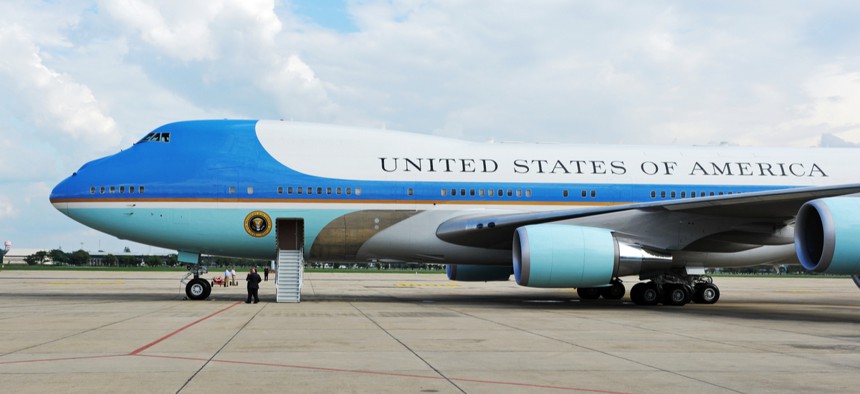Scrapped: $24M Plan to Replace Refrigerators On Air Force One

1000 Words/Shutterstock.com
Rep. Joe Courtney says the no-bid deal “didn’t pass the smell test.”
The U.S. Air Force has scrapped a $24 million plan to buy new refrigerators for its presidential jets, according to Pentagon documents released Monday by Rep. Joe Coutrney.
“The Air Force, working with the White House Military Office, recently reviewed the investment for the VC-25A chiller replacement and jointly decided to terminate the effort,” Air Force Secretary Heather Wilson said in a May 29 letter to the Connecticut Democrat. The VC-25A is the Air Force designation for the two Boeing 747s that take the callsign Air Force One when the president is aboard.
In December, Wilson’s service gave Boeing a contract to swap out the VC-25As’ aging chillers, the large and highly customized refrigerators that hold an extra-large supply of food for the U.S.president and staff. Defense One first reported the deal. On Feb. 8, Courtney expressed his concerns in a letter to Wilson.
“Clearly, the Air Force is making the right decision [to] cancel the previously announced sole-source contract and hit restart on this process,” the congressman said in a statement on Monday. “Even with the understanding that the Air Force One mission brings with it unique requirements and challenges, a $24 million sole-source contract just didn’t pass the smell test.”
Among the considerations in cancelling the work, Wilson wrote, is that the existing jets are due to be replaced by the mid-2020s. Last year, the Air Force bought two new 747-8s for conversion for presidential service; they will be designated VC-25Bs.
“While the VC-25A chiller replacement requirement still exists, the progress on the VC-25B program weighed against the cost of the chiller effort makes termination the most prudent fiscal sense for the government,” she wrote.
But Wilson said that if the new Air Force One project is delayed, her service would reconsider buying new refrigerators for the current presidential jets.
“While not optimal, mitigation options exist to ensure food security until new aircraft are delivered,” Wilson wrote. “The Air Force has notified Boeing of the government’s intention to cancel the subject contract.”
A source with knowledge of the program said the refrigerator project was ”terminated for convenience.” Typically, programs canceled for convenience are not due to contractor performance.
A Boeing spokeswoman declined to comment and deferred questions to the Air Force. An Air Force spokeswoman confirmed the refrigerator program has been canceled, but was unable to immediately provide additional information.






